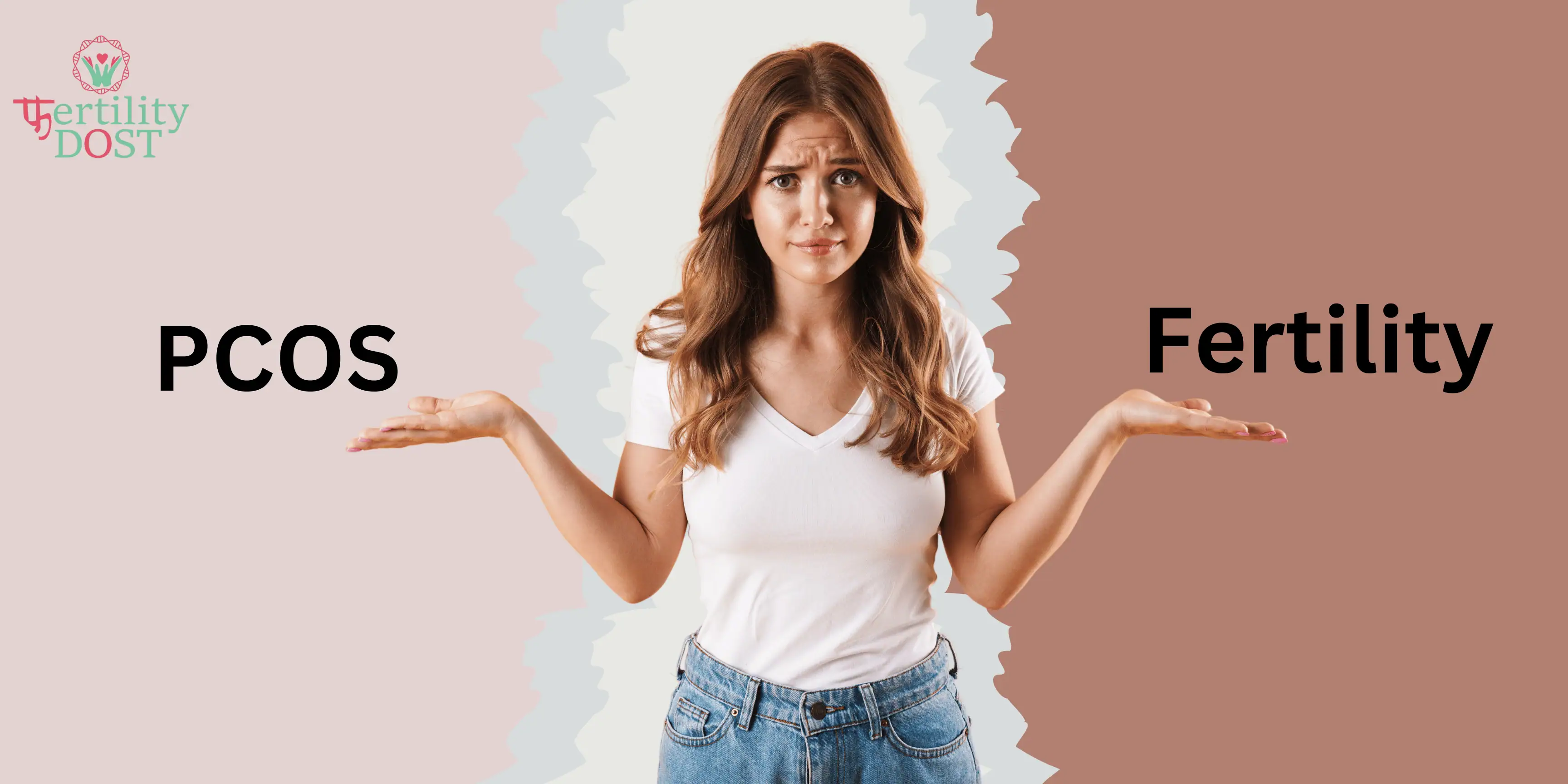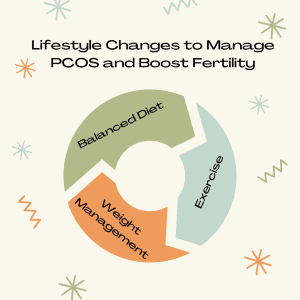PCOS and Fertility | Managing Symptoms To Get Pregnant
PCOS
Dealing with PCOS and trying to conceive? Tension mat lo! You’re not alone, and there are plenty of ways to manage your PCOS symptoms to improve your chances of conceiving. Whether you’re just starting out or have been on this journey for a while, let’s chat about some practical lifestyle changes, treatments, and support systems that can make a big difference for you.
What is PCOS, and How Does It Affect Fertility?
Polycystic Ovary Syndrome (PCOS) is one of the most common causes of infertility, and it’s a hormonal disorder that affects millions of women worldwide. PCOS can mess with your ovulation—ovulation hi nahi hota in many cases, or it’s irregular—which makes conception challenging. But poora solution hai! With the right lifestyle changes and treatments, many women with PCOS go on to have healthy pregnancies.
Success Story: Meet Priya, A PCOS Warrior Who Conceived in 6 Months
We would love to share Priya’s inspiring journey with you. Priya came to us after struggling with irregular periods, weight gain, and the emotional stress of not being able to conceive for over two years due to PCOS. After enrolling in our personalized PCOS Management Program, Priya made small but powerful lifestyle changes, focusing on her diet, exercise routine, and mental well-being.
With guidance from our fertility specialists and dieticians, Priya followed a tailored PCOS diet and exercise plan designed for her unique body type and symptoms. In just 6 months, Priya’s menstrual cycle became more regular, and she conceived naturally! Today, she’s a happy mom-to-be, and her story is a reminder that with the right support, “sab kuch possible hai.”
Common Symptoms of PCOS That Affect Fertility
PCOS isn’t just about irregular periods—yeh kaafi kuch aur bhi affect karta hai, especially when you’re trying to conceive. Here are the big ones:
- Irregular Menstrual Cycles: If your periods are all over the place, it’s harder to track ovulation, which is key to getting pregnant.
- Anovulation: This means you’re not ovulating at all—no egg, no baby.
- Excess Androgens: High levels of male hormones can lead to issues like acne, excessive hair growth, and trouble with regular ovulation.
- Insulin Resistance: Many women with PCOS have trouble managing their insulin levels, which can lead to weight gain and affect fertility.
- Weight Gain and Obesity: Weight gain and difficulty losing weight are common with PCOS, and this can further complicate fertility.
Lifestyle Changes to Manage PCOS and Boost Fertility
When it comes to managing PCOS, “lifestyle changes pe dhyan dena zaroori hai”. Here’s how you can manage your symptoms naturally and improve your chances of conception:

- Dietary Modifications: A healthy, balanced diet is key. Focus on foods that are low in refined carbs and sugar. Whole grains, lean proteins, and healthy fats are your friends. You can also consider adding supplements like inositol or omega-3s, which may help regulate insulin levels and improve ovarian function.
- Exercise and Physical Activity: Regular physical activity is important. Even light exercise like walking, yoga, or swimming can help balance hormones and improve insulin resistance. Roz ka thoda bahut exercise can make a big difference.
- Weight Management: Achieving even a small weight loss—about 5-10% of your body weight—can significantly improve your menstrual cycle and ovulation. Chhoti-chhoti changes can have a big impact on your fertility.
3-Day Free PCOS Diet Plan to Get You Started
We understand that diet plays a bahut bada role in managing PCOS symptoms and improving fertility. That’s why we’re offering you a 3-day PCOS diet plan—complete with recipes, juices, and healthy meals designed to balance your hormones and keep your insulin levels in check.
Here’s a sneak peek:
Day 1:
- Breakfast: Oats with chia seeds, almond milk, and berries
- Lunch: Quinoa salad with avocado, cucumber, and olive oil
- Dinner: Grilled chicken with steamed veggies
- Juice: Spinach, cucumber, and apple detox juice
Day 2:
- Breakfast: Scrambled eggs with spinach and whole wheat toast
- Lunch: Lentil soup with a side of mixed greens salad
- Dinner: Stir-fried tofu with bell peppers and brown rice
- Juice: Carrot and ginger juice with a dash of lime
Day 3:
- Breakfast: Smoothie with Greek yogurt, spinach, banana, and flaxseeds
- Lunch: Grilled salmon with a side of sweet potato mash
- Dinner: Chickpea curry with basmati rice
- Juice: Beetroot and pomegranate juice
This diet is a great start for managing PCOS, but remember, “har kisi ki body alag hotihai.” If you want a personalized diet and exercise routine based on your unique PCOS symptoms and goals, connect with us at Fertility Dost for a free consultation and customized plan!
Fertility Treatments for Women with PCOS
If lifestyle changes aren’t enough, no problem—there are several fertility treatments available for women with PCOS.

- Intrauterine Insemination (IUI) IUI is often the first fertility treatment offered to women with PCOS. It involves placing sperm directly into the uterus during ovulation. This method works well for women who ovulate irregularly.
- IVF for PCOS In-vitro fertilization (IVF) is often recommended if IUI doesn’t work. With IVF, eggs are retrieved from the ovaries, fertilized in a lab, and then placed in the uterus. IVF can be highly successful, but IVF ka waqt pe hona zaroori hai, so timing is key.
-
Ovarian Drilling
In some cases, ovarian drilling (a minor surgical procedure) can help restore ovulation for women who don’t respond to other treatments.
Natural Remedies and Complementary Therapies
Many women find that natural remedies can complement their fertility treatments and help manage PCOS symptoms:
- Acupuncture: This ancient therapy may help improve blood flow to the ovaries and regulate hormones.
- Herbal Supplements: Some women find relief from PCOS symptoms using herbal remedies like spearmint tea for excess hair growth or cinnamon to help regulate blood sugar levels.
- Mind-Body Techniques: Practices like meditation, yoga, and mindfulness can help reduce stress, which plays a big role in hormone regulation.
Manage, Treat, and Conquer PCOS!
Managing PCOS isn’t easy, but with the right lifestyle changes, treatments, and support, you can boost your fertility and improve your chances of conception. From tweaking your diet to regular exercise, from medical treatments to natural remedies—there’s always a way forward.
So, kya soch rahe ho? Start by making small lifestyle changes today, consult with your healthcare provider, and explore fertility treatments if needed.
Take action now, and book a consultation with a fertility specialist to take the next step in your fertility journey!
Your fertility journey may be challenging, but apne liye ek kadam lo aaj—and remember, we’re here to help every step of the way!






Your Comment Is Valuable For Us
Thanks For Your Feedback.